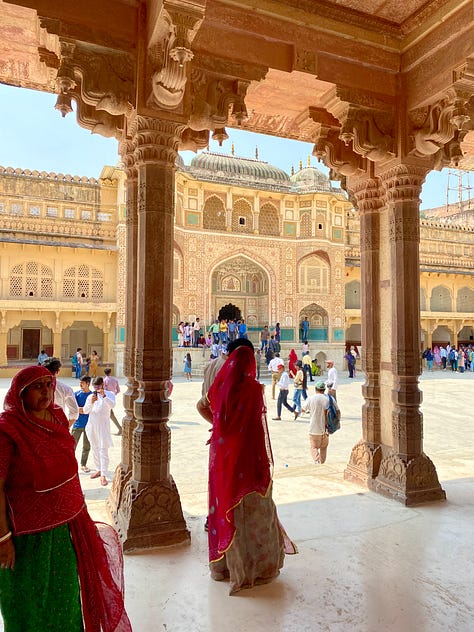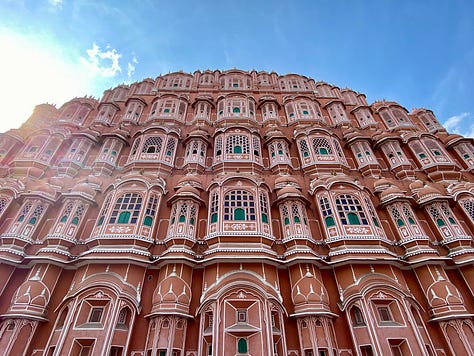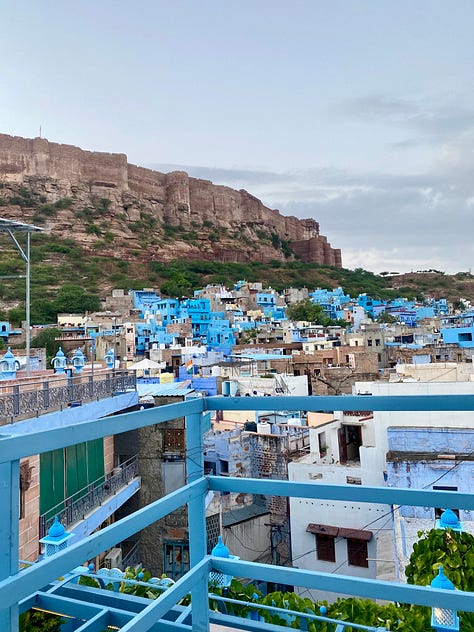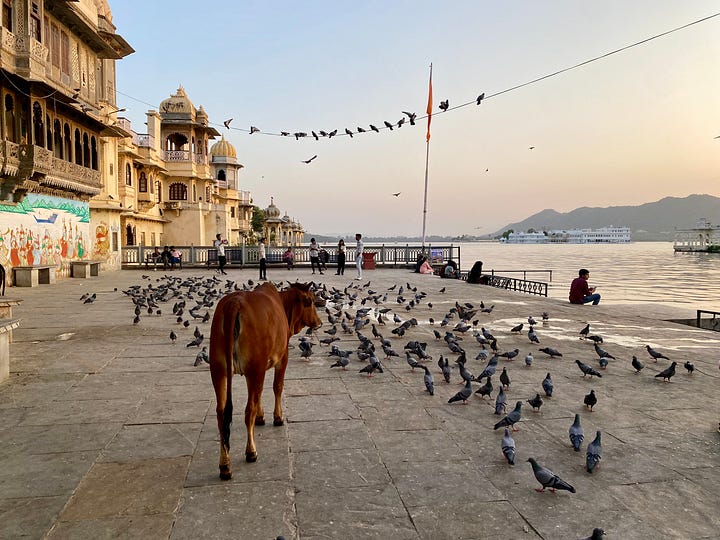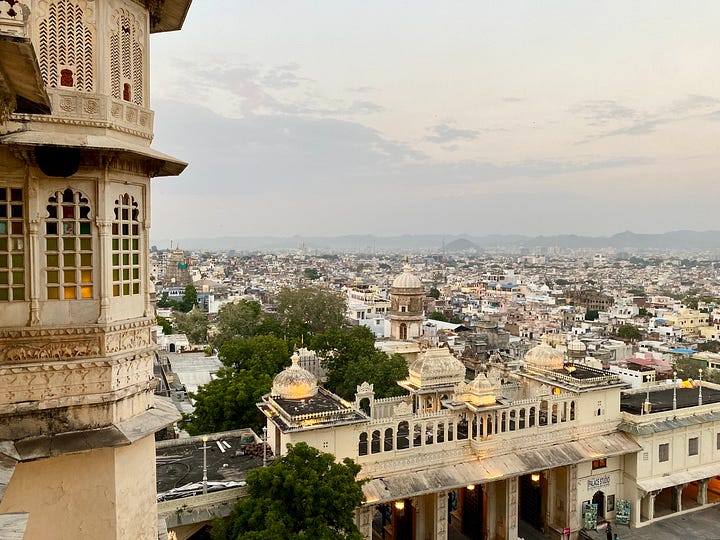Life on the road: a Golden Temple proves that solidarity at scale is possible!
And how to move forward as One, we must reckon with the past and urgently address colonial crimes!
Dear friends,
Following my week with the Tibetan Government in Exile, I made my way to Amritsar, which is home to the Golden Temple and the Partition Museum, to learn more about whether overcoming hunger is possible and the history of India.
As a bit of background for those of you new to this newsletter, I’m the co-founder of Atlas, the global political party in the making uniting people worldwide for freedom, equity and well-being. We announced our transition from an advocacy organisation to a political party on September 15th, and I took the decision with my co-founder Andrea to pack up our lives and hit the road to support volunteers and teams in establishing parties worldwide and learn from different political realities.
Our first stop is in India! We started by meeting the team and doing events in Delhi before heading to Dharamshala to meet the Central Tibetan Administration. As part of this journey, I write a weekly newsletter to share my learnings and journey in building a global political party!
Read this post to hear about how a temple distributes 100,000 free meals a day, how the partition of India and Pakistan show why we must put in place a Global Truth and Reconciliation Commission, as well as my latest take on India’s democracy and its contradictions.
🇮🇳 Destination: Amritsar
Last week, I headed to Amritsar for two main reasons that might be of interest: 1. the Golden Temple, 2. the Partition Museum.
The Golden Temple
Amritsar is home to the Golden Temple, the most significant shrine of the Sikh religion. And
absolutely wanted to visit it, not just to see its beauty but to understand better how it manages to practice solidarity at great scale.As the BBC explains, “Sikhs all over the world do seva in gurudwaras (Sikh temples), most often in simple acts like cleaning the floors, serving meals and maintaining order in the temple. Others perform seva in their private life through acts of generosity and charity.”
But the Golden Temple is just another level of solidarity: it has a free kitchen (the largest in the world), serving 100,000 meals per day, 24 hours a day, seven days a week. The catch? There is none: everybody is welcome to eat there, regardless of their religion or any other characteristic.
Every day, around 500 volunteers prepare meals that are paid for by donations!
Consider what we could achieve if our public policies and governmental attention were focused on serving those most in need, on creating solidarity and striving for collective well-being?!
At Atlas, we strive for this. Well-being, equity and freedom are our reason to exist. And we want to push for it in power but not only. Inspired by our work and learnings in India, we are planning a new stream of work: direct services! More details coming in December, but don’t hesitate to reach out to be involved before that :)
The Partition Museum
I was completely ignorant about what happened after India gained its independence, how India and Pakistan were separated, and the violence that ensued. And that’s problematic: to move forward as One, we must reckon with the past and urgently address colonial crimes!
Quick recap (Source: BBC. Find a more complete history of the partition on the museum’s website):
“When Britain granted India independence, the territory it had ruled over was divided, or partitioned, into India and the new state of Pakistan (with East Pakistan later becoming Bangladesh). This created an upsurge of violence, in which approximately 15 million people were displaced and an estimated one million died. India and Pakistan have remained rivals ever since.”
The reason for the partition:
"The British used religion as a way of dividing people in India into categories"
"When it looked likely that India would get independence, many Muslim Indians became worried about living in a country ruled by a Hindu majority. They thought they would be overwhelmed. They started to support political leaders who campaigned for a separate Muslim homeland."
Congress was against the partition (for those of you unfamiliar with political parties in India, Congress is the party of Gandhi and Nehru).
Here are a few elements that struck me while at the museum:
After the British finally accepted independence, the question of borders came up. The Muslim minority became more and more adamant about their need for an independent state due to fears of being ruled by a Hindu government. Gandhi and his collaborators were very much in favour of a united and diverse India. They didn’t want to partition it, also due to the difficulty that lied in drawing up borders when you could find Mulsmim and Hindu communities living side by side across the territory.
We often think about history in a quite linear way, but it’s mostly messy as hell. The British accepted independence as it became clear that they could not maintain their unwanted, unjust and barbaric rule. It was obviously not because they suddenly became enlightened. Since they couldn’t maintain their power, the timeline had to be speedy: they took the decision to leave fast and didn’t plan ahead. Lord Mountbatten “assumed the role of the last viceroy on 24 March 1947. He announced the Partition Plan on 3 June 1947, declaring that the British had decided to transfer power to the Indian and Pakistani governments by mid-August 1947.” This gave him just a couple of weeks to figure out the partition details (yeah, I know, it’s insane that it would still be up to a colonial power to decide on how a country would be divided. We have seen this before, and it always leads to terrible outcomes). This obviously led to terrible decision-making processes. He decided to call upon Lord Radcliffe from England to draw the partition lines. Wait for it: Radcliffe had never been to India, basically knew nothing about it, and was given outdated maps and information to just draw a line over a map. Consider the disaster…
The lack of clarity, transparency and lack of involvement of those whose lives would be impacted by the partition led to horrors. “The mass migration that followed saw the death of millions and displacement of many more. Families were torn apart. People migrating by trains were massacred and butchered. Women were killed, abducted and raped.” Those displaced who survived would always feel away from home, living first in refugee camps and struggling to rebuild their lives for decades.
The partition still very much impacts India and Pakistan’s relationship.
📣 The political corner: let’s talk about India and Truth & Reconciliation
It’s time for a Global Truth and Reconciliation Commission
Why am I mentioning the Partition Museum at such length? Because that’s just one part of colonial history that we must learn about, from, and try to mend to the best of our abilities worldwide. In the political manifesto - The Philosophy of Unity - and I wrote, we discuss the urgent and fundamental need to reckon with the past and work to address it if we are ever to live in an equitable world:
To be able to live peacefully and in unity across the world, we must reckon with the past to be able to move forward. Unity must be built on solid foundations. We must find a way to address history, recognise what has been done, compensate for past crimes and move forward as One.
The impacts of Colonialism continue to be felt, resulting in a scarred and divided world. Between 1492 and 1914, Europeans colonised 84% of the planet. Colonialism had dramatic impacts on the lives of people, their very survival and freedom, as well as the economic consequences entire countries suffered at the hands of exploiters: whole governance systems, industries and countries were destroyed to benefit colonial powers that became wealthier because of their very crimes. Take India: “Extreme poverty in India increased under British rule, from 23% in 1810 to more than 50% in the mid-20th century. Far from benefitting the Indian people, colonialism was a human tragedy with few parallels in recorded history.” “It is clear that somewhere in the vicinity of 100 million people died prematurely at the height of British colonialism.” Coloniasm’s impacts are still felt heavily as one of the most critical factors in today’s economic inequalities around the globe. Former colonial powers continue to reap the benefits of their crimes while colonised people and nations suffer the consequences. Yet, they have often not taken the necessary steps to address the harm done. Across the world, anti-colonial movements are pushing forth the debate and actions on truth and reconciliation, with initiatives being set up. Apologies, restitutions of stolen cultural symbols, dismantlement of colonial symbols and financial compensations have taken place. However, countries genuinely trying to address their past is an exception, not systematically nor consistently a path pursued. Recently, the European Parliament adopted a resolution on the “fundamental rights of people of African descent in Europe,” recognising that “the racism and discrimination experienced by people of African descent is structural” and comes from “historically repressive structures of colonialism and the transatlantic slave trade.”
It is high time to put institutions such as a Global Truth and Reconciliation Commission in place to address the open scars and unfinished discussions from colonialism. All countries involved in the crimes of colonialism must take part and commit to implementing the outcomes of the commission. From apologies to compensation or restitution of stolen art and properties, countless avenues exist to mend drifts across groups and reach true Unity. All must be pursued. None will erase the immense suffering caused, but they are a necessary step in addressing inequities created due to colonialism. While previous efforts, such as the ones of South Africa, Rwanda and ex-Yugoslavia, have been imperfect, they have enabled entire nations to move forward instead of falling into civil war.
Some thoughts on India, the biggest democracy in the world
In my first newsletter from India, I described at length many issues activists, politicians, and citizens told me about. Those include restrictions on the free press, harassment of dissidents, and monetary control over NGOs. Those are all true.
But what I’m learning in India is that multiple realities can exist at the same time. Silence and chaos. Authoritarian tendencies and incredible democratic spirit. India has been, for me, the country of all contradictions.
I’ve been here for three weeks now, meeting and learning every day with those taking action on the ground. I’ve been trying to grasp as much information as possible, see more every day and keep my mind open. And I’m more lost than ever when asked how I would describe India. Every day that passes makes it more complicated. But what do you expect? India is 3.287 million km², with a population of over 1,4 billion people (for my European friends out there, that’s almost twice the population of Europe) and a diversity of religions, languages and cultures like no other.
While the direction that India is taking when it comes to democracy is worrying, I can’t not be amazed by the fact that all the young people I speak to tell me that the greatest strength of their country is its diversity and inclusivity. They have a great sense of pride in their country being so multicultural.
Obviously, things are never that simple. Long before its independence and partition, religious violence existed. Today, there is an increase in religious-based violence in the country. As Human Rights Watch mentioned, “The continued vilification of Muslims has resulted in an increase in hate crimes.”
However, whilst travelling in India, I cannot avoid noticing the diversity of this country and of communities living together, one that I have never witnessed elsewhere.
The Indian Supreme Court refused to legalise marriage for all
Check out
’s video about the refusal of the Indian Supreme Court to grant legal recognition to same-sex marriages.💫 Next up: Mumbai
I’m sending you this newsletter from Mumbai, where we just hosted our first public meeting in the city! In next week’s newsletter, I’ll tell you more about it, as well as further learnings on multiculturalism! Here are two pictures from our meeting, until then!

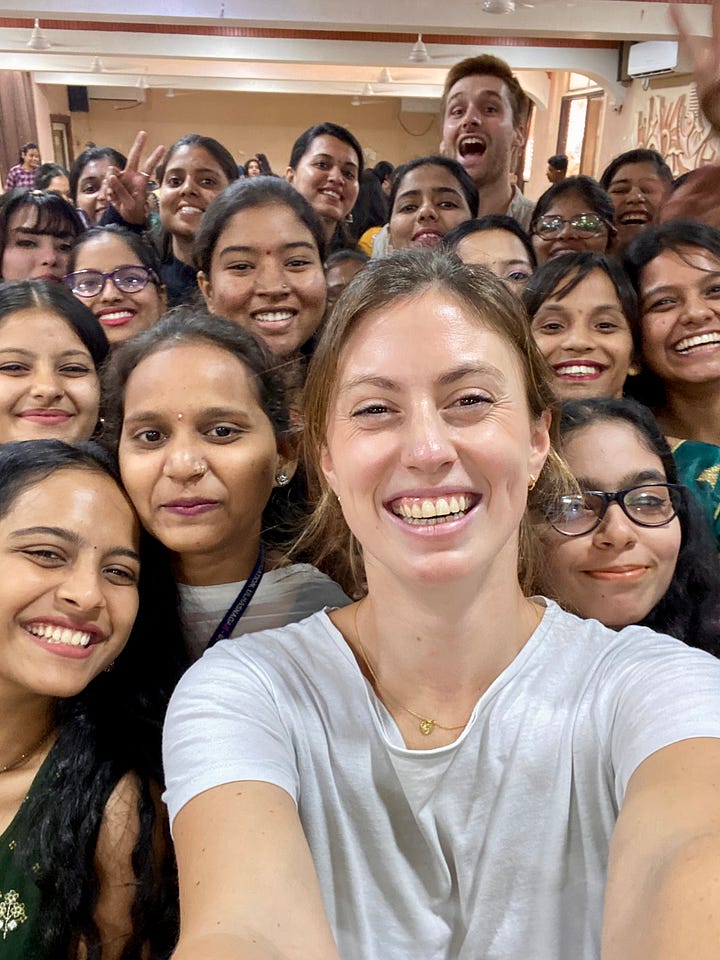
After Mumbai, we will head for a few days to Bengaluru (and will host another meeting), before leaving India for Australia! Reach out if you are there 🇦🇺 !
Let me know what you think, send me your feedback and ideas, and don’t forget to take action to unite the world.
One way is to join or donate to Atlas, the global political party uniting people worldwide to create a freer, better and more equitable world (click here)!
Cheers,
Colombe
P.S.: here are a few pictures from Rajasthan. Enjoy the insane beauty!
